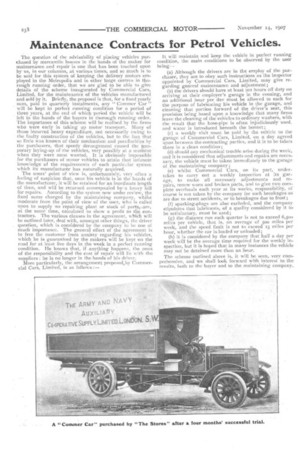Maintenance Contracts for Petrol Vehicles.
Page 18

If you've noticed an error in this article please click here to report it so we can fix it.
The question of the advisability of placing vehicles purchased by mercantile houses in the hands of the maker for maintenance and repair is one that has been touched upon by us, in our columns, at various times, and so much is to be said for this system of keeping the delivery motors employed in the Metropolis and in other large centres in thorough running order, that we are glad to be able to give details of the scheme inaugurated by Commercial Cars, Limited, for the maintenance of the vehicles manufactured and sold by it. Briefly, the proposal is that, for a fixed yearly sum, paid in quarterly instalments, any " Commer Car " will be kept in perfect running condition for a period of three years, at the end of which period the vehicle will be left in the hands of the buyers in thorough running order. The importance of this scheme will be realised by the firms who were early in taking up motor transport. Many of those incurred heavy expenditure, not necessarily owing to the faulty construction of the vehicles, but to the fact that so little was known of their mechanism arid peculiarities by the purchasers, that speedy derangement caused the temporary laying-up of the vehicles, very possibly at a moMent when they were most wanted. It is obviously impossible for the purchasers of motor vehicles to attain that intimate knowledge of the requirements of each particular system which its manufacturer has naturally acquired.
The users' point of view is, unfortunately, very often a feeling of suspicion that, once his vehicle is in the hands of the manufacturer, it will be retained for an inordinate length of time, and will be returned accompanied by a heavy bill for repairs. According to the system now under review, the fixed sums charged by the maintaining company, whilst moderate from the point of view of the user, who is called upon to supply no repairing plant or stock of parts,-are, at the same time, calculated to show a profit to the contractors. The various clauses in the agreement, which will be outlined later, deal with, amongst other things, the driver question, which is considered by the company to be one of much importance. The general effect of the agreement is to free the customer from anxiety regarding his vehicles, which he is guaranteed by the makers will be kept on the road for at least live days in the week in a perfect running condition. He knows that, if anything happens, the onus of the responsibility and the cost of repair will lie with the suppliers : he is no longer in the hands of his driver.
More particularly, the arrangement proposed..by Commercial Cars, Limited, is as follows It will maintain and keep the vehicle in perfect running condition, the main conditions to be observed by the user being- (a) Although the drivers are in the employ of the purChaser, they are to obey such instructions as the inspector appointed by Commercial Cars, Limited, may give regarding general maintenance and adjustment ;
(b) the drivers should have at least ten hours off duty on arriving at their employer's garage in the evening, and an additional hour per day must be allowed to each for the purpose of lubricating his vehicle in the garage, and cleaning that portion forward of the driver's seat, this provision being based upon a knowledge that many firms leave the cleaning of the vehicles to ordinary washers, with the result that the hose-pipe is often injudiciously used. and water is introduced beneath the bonnet;
(c) a weekly visit must be paid by the vehicle to the garage of Commercial Cars, Limited, on a day agreed upon between the contracting parties, arid it is to be taken there in a clean condition ; (d) should any mechanical trouble arise during the week, and it is considered that adjustments and repairs are necessary, the vehicle must be taken immediately to the garage of. the maintaining company ; (e) whilst Commercial Cars, on its part, undertakes to carry out a weekly inspection at its garage, to make all necessary adjustments and repairs, renew worn and broken parts, and to give two cornplete overhauls each year at its works, responsibility, of course is not taken by the company for such breakages as are due to street accidents, or to breakages due to frost ; (f) sparking-plugs are also excluded, and the company stipulates that lubricants, of a quality considered by it to be satisfactory, must be used; (g) the distance run each quarter is not to exceed 6,500 miles per vehicle, that is, an average of soo miles per week, and the speed limit is not to exceed rs miles per hour, whether the ear is loaded or unloaded; (h) it is considered by the company that half a day per week will be the average time required for the weekly inspection, but it is hoped that in many instances the vehicle may not be detained more than an hour.
The scheme outlined above is, it will be seen, very comprehensive, and we shall look forward with interest to. the results, both to the buyer and to the maintaining company.






















